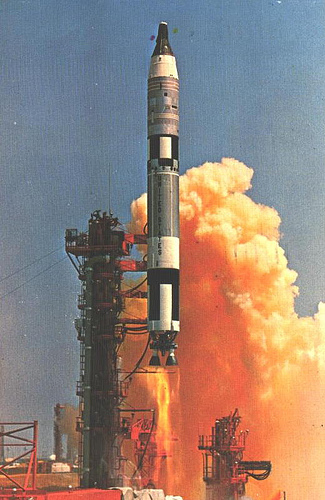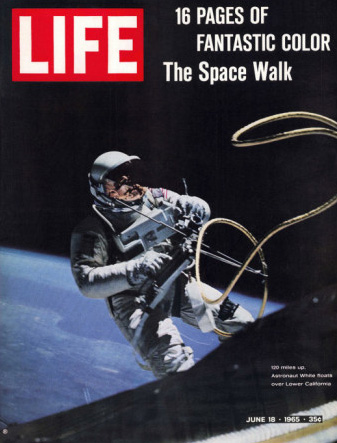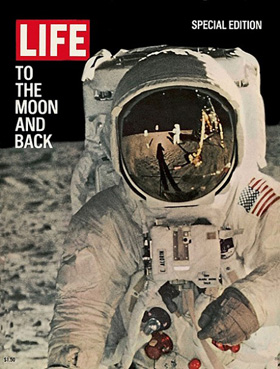 I would pay dearly for young people to feel what it was like to be a scientifically minded child in the 1960s. It was a special and beautiful moment. Each week there was a new step toward the stars. And this was not science fiction, this was real. There was an exhilaration to it that I don’t think can be found in any other venture. The door to infinite space was creaking open for us.
I would pay dearly for young people to feel what it was like to be a scientifically minded child in the 1960s. It was a special and beautiful moment. Each week there was a new step toward the stars. And this was not science fiction, this was real. There was an exhilaration to it that I don’t think can be found in any other venture. The door to infinite space was creaking open for us.
Never, in all the long history of mankind, had the heavens been reachable. And then, suddenly, they were. Satellites were going up one after another… and functioning. A few men, strapped perilously to the tops of dangerous rockets, followed.
Then came the Gemini program, and our first serious steps away from the planet. As it moved forward, we saw men living in space for more and more days at a time; they learned to rendezvous; they even left their capsules and “walked in space.”

And then we geared-up for a trip to the moon… and succeeded!

Why wouldn’t a young person believe humanity was on its way to the stars? Humanity WAS on its way to the stars!
On top of that, we had Star Trek. While Star Trek was clearly fiction, it was easy to see it as just a few steps ahead of us. And Star Trek was all about morality tales. We looked forward not only to an interesting future, but to a good one, where we all became better.
And again, this was not at all unreasonable – we were taking clear steps toward it day by day. This was REAL.
And Then…
And then, it all stopped. Skylab and the shuttle were steps backward, useful mostly for saving face. Humanity stopped progressing and pulled back from the stars. If any of us still need a reason to judge government as unworthy of our time and treasure, here it is.
Since space was closed, we’ve endured boring, washed-out decades, focused on anything but the awe-inspiring, the good, and the heroic. Five-plus decades have been stripped of the greatest excitement, discovery, and growth that was ever within humanity’s grasp.
Our current era features no goals save bodily comfort and no aspirations save status and trouncing one’s enemies. Underlying it all is a palette of manufactured fears that can only be salved by buying the right products or electing the right politicians. We are living though the triumph of manipulation and the disappearance of vigorous individuals.
To illustrate what we’ve missed, here are a few quotes from the men who walked on the moon:
It was to me like I was just sitting on a rocking chair on a Friday evening, looking back home, sitting on God’s front porch, looking back at the Earth; looking back home. It was really that simple, but it was an overpowering experience.
– Gene Cernan, Apollo 17
On the return trip home, gazing through 240,000 miles of space toward the stars and the planet from which I had come, I suddenly experienced the universe as intelligent, loving, harmonious… My view of our planet was a glimpse of divinity… We went to the moon as technicians, we returned as humanitarians.
– Edgar Mitchell, Apollo 14
Since that time I have not complained about the weather one single time. I’m glad there is weather. I have not complained about traffic; I’m glad there are people around. One of the things I did when I got home; I went down to shopping centers, and I’d just go there, get an ice cream cone or something, and just watch the people go by. And think “Boy we’re lucky to be here. Why do people complain about the Earth? We are living in the Garden of Eden.”
– Alan Bean, Apollo 12
As Neil and I first stood on the surface of the moon looking back at Earth—a bright blue marble suspended in the blackness of space—the experience moved us in ways that we could not have anticipated.
– Buzz Aldrin, Apollo 11
Please remember that everything done back then was done with technology that is now obsolete. The stars are not beyond our grasp; it’s that our lives have been restrained, and our expectations that have been neutered.
Modern existence – the televised and taught-in-government-schools kind – can see nothing beyond comfort and status; discovery is a non-factor. The life they advertise features endless activity but is devoid of substance.
Still, a doorway to the stars stands open to us. But we must act on our own, rather than waiting for permissions that never really come.
**
Paul Rosenberg
freemansperspective.com

I keep re-watching the movie “October Sky” and remembering the tremendous excitements of the 1950’s and 1960’s. It is really a challenge to think about how to rekindle that excitement.
“Government is not the answer, it is the problem.” Ronald Reagan.
Our future lies in post primate civilization here on earth, and then outer space. How we get from here to there is the primary problem. Current civilization is addicted to power over others.
Read :The Weapon Shops of Isher” by A. E. Van Vogt.
India and China have invested resources for decades towards moon exploration and so far managed to land unmanned crafts on the moon’s surface in the 2020s. They are still likely years (if not decades) away from landing a man on the moon though they have vastly superior technology and much greater knowledge of rockets in the 21st century than the U.S. had in the 1960s. Did the U.S. somehow achieve in 10 years in the 1960s what even NASA says will take 20 years today? Seems odd. Why so much harder today to put a man on the moon than the initial Apollo program? China doesn’t lack commitment, money, technology, or scientific expertise. yet they haven’t been able to pull off what the U.S. did more than 50 years ago? That pattern of a 50 year hiatus is not present in any other type of exploratory feat that I am aware. When Lindberg first flew solo across the Atlantic it was almost immediately followed by others and within a decade was common place. But putting a man on the moon since Apollo is not only non-existent it’s still not even close by any nation, and yet, this is during a time when computing technology has exploded in its sophistication. As you mentioned 1960s technology is long ago obsolete. Defies common sense in so many ways that what could be done with lesser technology the first time (and first time is always the hardest) was somehow done much quicker start to finish by NASA in the 1960s than it can be accomplished today with superior technology?
I was there … at Langley AFB while the astronauts trained (father USAF) … and later worked at NASA/Goddard. Space activity has not ended, but it’s clear our oligarchy does not want the peasantry to know the real space activities occurring.
ZPE and antigravity are thought by many to be extremely highly classified current technologies:
— ZPE would end the energy cartels as we know them.
— antigravity would allow a mobility level that would make most governments powerless and
allow people to explore the universe.
Read (as primers):
Nick Cook: The Hunt for Zero Point
Joseph P. Farrell’s books about the nazi “bell”
Igor Witkowski’s book about the Nazi Wunderwaffen
I read a good essay once that made the argument that human and Western civilization peaked in 1969 after technological advances culminating with the moon landings and first flight of supersonic Concorde. I’m sympathetic to this, although as a child of the late 70s and 80s, the space shuttle era still seemed to inspire awe – at least until Challenger.